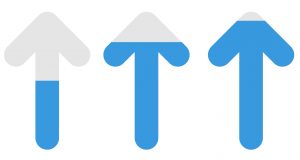The leadership team is disappointing
The CEO of a chemical company has carefully surrounded himself with a group of managers. He has valuable managers in production, sales and IT. All the members of the leadership team are better than average in their area of expertise. But the team’s accomplishments are disappointing: little collaboration, never-ending discussions and a slow decision-making process. In reality, this is not a team. Personal tensions are running high and meetings are becoming increasingly difficult. The dinner parties the CEO has organized have been very animated, but did not result in any structural improvements. The CEO is wondering if things will still work out. Is it even possible to form a team with these people?
Success factors
Teams with high performers are not necessarily high-performing teams. Teams with high performers turn out to spend more time than average on discussions. This is because each team member has strong analytical skills. This is because high performers are used to follow their own direction. Every team member wants to convince the others that he/she is right.
 Teams collaborate on a temporary basis. Team members have their own personal history, character, expertise, and ideas on how a team should work together. Every team has to develop itself and this development means investment. It’s not about becoming a circle of friends, but about creating a productive work force. A team that doesn’t invest in development is wasting its energy on internal struggles and rivalries.
Teams collaborate on a temporary basis. Team members have their own personal history, character, expertise, and ideas on how a team should work together. Every team has to develop itself and this development means investment. It’s not about becoming a circle of friends, but about creating a productive work force. A team that doesn’t invest in development is wasting its energy on internal struggles and rivalries.
A team’s development happens in phases. Each phase has specific characteristics and will reveal specific concerns. Activities have been designed to lead teams to the next phase in the most efficient and effective way. This is how you build good relations, trust, clear procedures, working methods and common ideas in teams. All phases, from orientation to result, can be observed in every team. Only a few teams are able to reach the phase of great results independently. In this phase we can observe synergy, a high level of flexibility, smooth communication and a team that responds to wishes coming from their surroundings.
All phases from orientation to performance are to be observed in every team
Because teams often play a crucial role in an organization, much research has been done to find team success factors. Important success factors are:
- the process;
- the team’s composition;
- the team’s working methods;
- the future vision.
A well-functioning team scores high in all of these categories, is aware of its vulnerable factors and works to improve these.
Skills of individual team members are also important. It all starts with a good portion of self-knowledge. Team members can only make a valuable contribution to a team when they are aware of their own projections, preferences and the effects of their behaviour. Consequently, team members also need team skills: constructive disagreement, negotiating, procedures for decision-making, creating and following methods to solve discussions and problems.
A methodical approach
 Experience has taught us that teams can almost always improve significantly. Often teams and their leaders think they are already in the accomplishment phase, without having finished the previous phases successfully. To take a leap forward, you first have to take a small step back.
Experience has taught us that teams can almost always improve significantly. Often teams and their leaders think they are already in the accomplishment phase, without having finished the previous phases successfully. To take a leap forward, you first have to take a small step back.
Team members often focus on the way people relate to each other. But relations are just one part of all the factors that have an influence and it’s important to keep in mind that every problem will ultimately lead to a problem between people. Don’t pay too much attention to this. Here’s the rule: when you put energy into something, it becomes larger! Instead focus on the results and manage the interaction between team members.
Team development is a combination of the development of the phases and improvement of all success factors while paying attention to individual skills. Always link team development to a substantial issue of the team for example, ‘How will we improve customer relations?’ Start with a diagnosis and agree on the problem to be solved. Design a program that consists of a combination of activities. Work on the issue in a safe environment, using some supporting working methods and activities that are linked to the phase the team is in. Reflect with all team members on the process, as well as the results and learn how to improve teamwork. The team will quickly make some significant steps.
